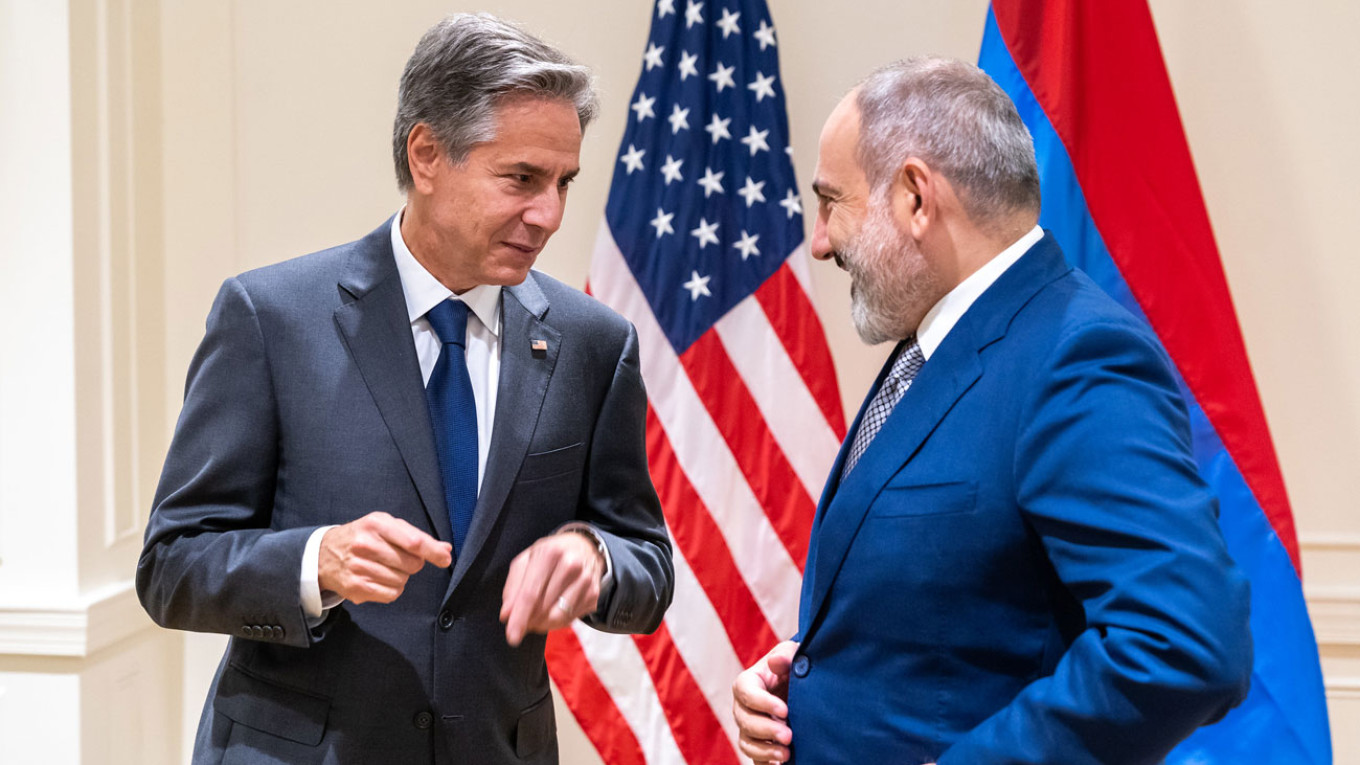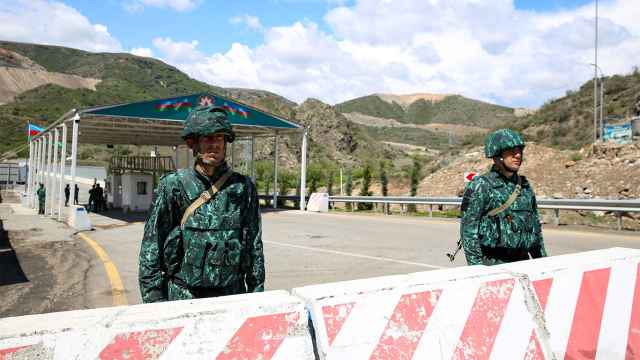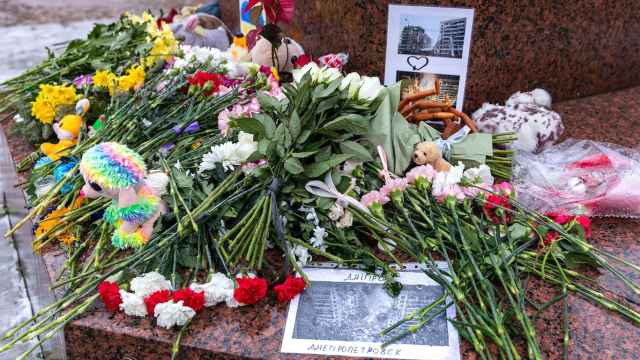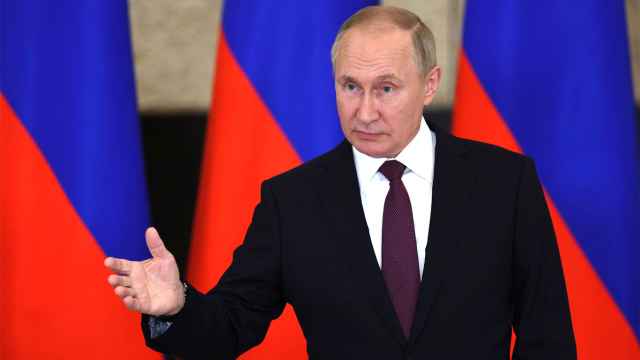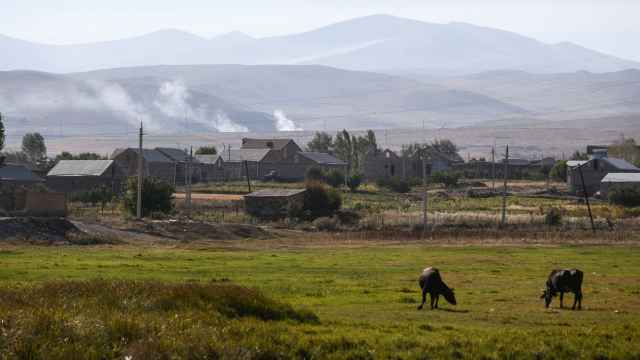Joint military exercises between Armenian and U.S. forces began on Monday, the latest sign of Yerevan's drift from its longtime ally Moscow.
The drills come amid mounting frustration in Armenia over what it sees as Russia's failure to act as a security guarantor as tensions escalate with neighboring Azerbaijan.
"Exercise Eagle Partner's opening ceremony has kicked off," the U.S. Army's Europe and Africa spokesperson told AFP.
Armenia's Defense Ministry said the exercises aimed to "increase the level of interoperability" with U.S. forces in international peacekeeping missions.
The U.S. Army Europe and Africa Command said around 85 of its soldiers would train with 175 Armenian troops on Sept. 11-20.
It added that the exercises would help Armenia's 12th Peacekeeping Brigade meet NATO standards ahead of an evaluation later this year.
Kremlin spokesman Dmitry Peskov said Armenia's decision to work with the U.S. instead of conducting drills with the Moscow-led Collective Security Treaty Organisation (CSTO) required "very deep analysis".
"Of course, we will try to comprehend and understand all this. But in any case, we will do so in close dialogue with the Armenian side," he said.
Moscow last week summoned Armenia's ambassador to complain about the "unfriendly steps" the country was taking.
Russia's Foreign Ministry said Yerevan's envoy was given a "tough talk" but insisted that the countries "remain allies."
"It sounded more like a threat to Yerevan than a description of reality," said Gela Vasadze, an independent political analyst.
"In fact, Russian-Armenian relations have reached a strategic impasse," he told AFP.
'Weakened Russia'
In Yerevan, residents expressed frustration over Russia's lack of military and political support as tensions with Azerbaijan flared again.
Mariam Anahamyan, 27, told AFP that Armenia had made a mistake by "pinning its hopes on the Russians."
"So now let's try with the Americans. The consequences may be bad but not trying would be even worse," she said.
For Arthur Khachaduryan, a 51-year-old security guard, "Russia failed to keep its commitments during the war and has even made our situation worse."
He was referring to a brief but bloody conflict in 2020 for control over Nagorno-Karabakh, a separatist region in Azerbaijan.
Russia brokered a ceasefire and deployed some 2,000 peacekeepers to the Lachin corridor, which connects Armenia to Nagorno-Karabakh.
But Armenian Prime Minister Nikol Pashinyan recently said Moscow was either "unable or unwilling" to control the passage.
His government has accused Azerbaijan of closing the road and blockading the mountainous region, spurring a humanitarian crisis in Armenian-populated towns.
Pashinyan also recently claimed that Armenia's security reliance on Russia was a "strategic mistake."
Bogged down in its invasion and isolated from much of the international community, "weakened Russia is rapidly losing influence in its Soviet-era backyard," said independent analyst Arkady Dubnov.
"Armenians are frustrated with Russia, which failed to help them during the Karabakh war and its aftermath," he said, adding that Moscow "also seems to be lacking a clear plan, strategy in the Caucasus."
'New allies'
Nagorno-Karabakh has been at the center of two wars between Azerbaijan and Armenia.
In the 1990s, Armenia defeated Azerbaijan and took control of the region, along with seven adjacent districts of Azerbaijan.
Thirty years later, energy-rich Azerbaijan, which built a strong military and secured backing from Turkey, sought revenge against its neighbor by launching a new major offensive.
After the 2020 war, Yerevan was forced to cede several territories it had controlled for decades.
The situation in Nagorno-Karabakh remains volatile and Armenia has accused Azerbaijan of moving troops near the region over the past week, raising the specter of a fresh large-scale conflict.
The EU and United States have taken a leading role in mediating peace talks but have so far failed to bring about a breakthrough.
Meanwhile, "the Kremlin has no resources — neither the will — to help Armenia and is letting Azerbaijan and Turkey pursue their objectives," analyst Dubnov said.
"In this situation, Armenia is trying to forge strong new alliances."
A Message from The Moscow Times:
Dear readers,
We are facing unprecedented challenges. Russia's Prosecutor General's Office has designated The Moscow Times as an "undesirable" organization, criminalizing our work and putting our staff at risk of prosecution. This follows our earlier unjust labeling as a "foreign agent."
These actions are direct attempts to silence independent journalism in Russia. The authorities claim our work "discredits the decisions of the Russian leadership." We see things differently: we strive to provide accurate, unbiased reporting on Russia.
We, the journalists of The Moscow Times, refuse to be silenced. But to continue our work, we need your help.
Your support, no matter how small, makes a world of difference. If you can, please support us monthly starting from just $2. It's quick to set up, and every contribution makes a significant impact.
By supporting The Moscow Times, you're defending open, independent journalism in the face of repression. Thank you for standing with us.
Remind me later.


